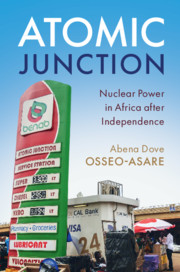Book contents
- Atomic Junction
- Atomic Junction
- Copyright page
- Epigraph
- Contents
- Figures
- Preface: Nuclear Reveries
- Acknowledgments
- Abbreviations
- 1 Introduction: “No Country has Monopoly of Ability”
- 2 Nuclear Winds: Particles without Boundaries
- 3 Scientific Equity: Physics from the Soviets
- 4 Atomic Reactors: A Fission Facility for Ghana
- 5 Radiation Within: Monitoring Particles in Bodies
- 6 Atomic Lands: Risks on a Nuclear Frontier
- Epilogue: Nuclear Power at the Crossroads
- Notes
- Persons Cited and Consulted
- Works Cited and Consulted
- Index
2 - Nuclear Winds: Particles without Boundaries
Published online by Cambridge University Press: 12 September 2019
- Atomic Junction
- Atomic Junction
- Copyright page
- Epigraph
- Contents
- Figures
- Preface: Nuclear Reveries
- Acknowledgments
- Abbreviations
- 1 Introduction: “No Country has Monopoly of Ability”
- 2 Nuclear Winds: Particles without Boundaries
- 3 Scientific Equity: Physics from the Soviets
- 4 Atomic Reactors: A Fission Facility for Ghana
- 5 Radiation Within: Monitoring Particles in Bodies
- 6 Atomic Lands: Risks on a Nuclear Frontier
- Epilogue: Nuclear Power at the Crossroads
- Notes
- Persons Cited and Consulted
- Works Cited and Consulted
- Index
Summary
This chapter locates Ghana’s quest for nuclear power within the context of French bomb tests in the Sahara that sent radioactive materials across West Africa. In 1959, French scientists announced plans to detonate a series of bombs in their colony of Algeria, where resistance fighters sought to remove the French occupation. The French bomb tests further exacerbated tensions between the European nation and African leaders like Nkrumah, who supported the Algerian independence struggle. The prospect of French nuclear weapons extended the terror of Western atomic bomb activity from Nagasaki and Hiroshima, and the South Pacific test fields to the African continent. Once fallout from the French detonations reached Ghanaian towns, the outrage from Nkrumah’s government and his international supports was tremendous. The French bombs helped to mobilize interest in fallout monitoring at the University of Ghana and led to Ghana’s bid to join the International Atomic Energy Agency (IAEA) and Ghana’s efforts to eliminate bomb testing across Africa through the United Nations.
Keywords
- Type
- Chapter
- Information
- Atomic JunctionNuclear Power in Africa after Independence, pp. 19 - 48Publisher: Cambridge University PressPrint publication year: 2019

